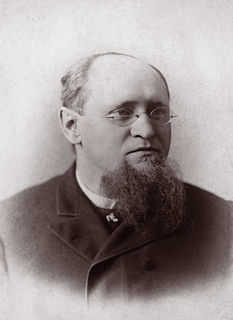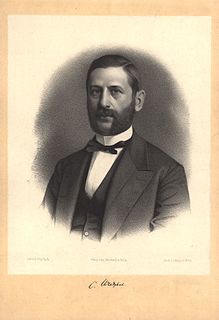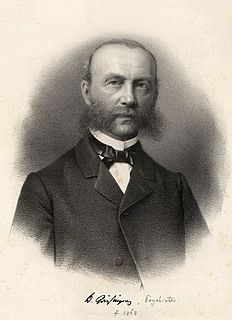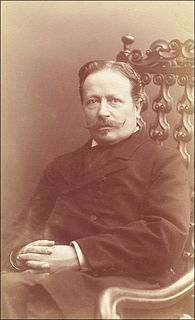
Rudolf Gottfried Arndt was a German psychiatrist from Bialken, district of Marienwerder.

Karl Ludwig Kahlbaum was a German psychiatrist.

Karl Friedrich Otto Westphal was a German psychiatrist from Berlin. He was the son of Otto Carl Friedrich Westphal (1800–1879) and Karoline Friederike Heine and the father of Alexander Karl Otto Westphal (1863-1941). He was married to Klara, daughter of the banker Alexander Mendelssohn.

Ludwig Binswanger was a Swiss psychiatrist and pioneer in the field of existential psychology. His parents were Robert Johann Binswanger (1850-1910) and Bertha Hasenclever (1847-1896). Robert's German-Jewish father Ludwig "Elieser" Binswanger (1820-1880) was founder, in 1857, of the "Bellevue Sanatorium" in Kreuzlingen. Robert's brother Otto Binswanger (1852-1929) was a professor of psychiatry at the University of Jena.

Wilhelm Griesinger was a German neurologist and psychiatrist born in Stuttgart.

Georg Theodor Ziehen was a German neurologist and psychiatrist born in Frankfurt am Main. He was the son of noted author, Eduard Ziehen (1819–1884).

Johann Bernhard Aloys von Gudden was a German neuroanatomist and psychiatrist born in Kleve.

Alexander Carl Otto Westphal was a German neurologist and psychiatrist. He was the son of the psychiatrist Carl Friedrich Otto Westphal (1833–1890) and Clara Mendelssohn and the grandson of Otto Carl Friedrich Westphal.

Rudolf Leubuscher was a German physician and psychiatrist who was a native of Breslau.

Hermann Emminghaus was a German psychiatrist who was a native of Weimar. He was a pioneer of child and adolescent psychology, and a founder of developmental psychopathology.

Ludwig Meyer was a German psychiatrist born in Bielefeld.
Friedrich Groos was a German physician and philosopher born in Karlsruhe.
Johann Michael Leupoldt was a German psychiatrist born in Wießenstadt, Bavaria.

Carl Friedrich Flemming was a German psychiatrist born in Jüterbog. He was the father of cellular biologist Walther Flemming (1843-1905).
Arnold Kutzinski was a German psychiatrist and neurologist, known as an outspoken critic of psychoanalysis.

Adolph Albrecht Erlenmeyer was a German physician and psychiatrist born in Wiesbaden.

Carl Franz Moeli was a German neurologist and psychiatrist born in Kassel.

Friedrich Albrecht Erlenmeyer was a German physician and psychiatrist born in Bendorf bei Koblenz. He was the son of psychiatrist Adolph Albrecht Erlenmeyer (1822-1877).

Heinrich Laehr was a German psychiatrist born in Sagan, Silesia.

Jenny Thomann-Koller was a gynecologist, pediatrician, and Head of Internal Medicine at the Schweizerische Pflegerinnenschule mit Spital in Zurich. In her dissertation, Beitrag zur Erblichkeitsstatistik der Geisteskranken im Ct. Zürich. Vergleichung derselben mit der erblichen Belastung gesunder Menschen u. dergl., published in 1895, she introduced a control group which challenged the then-popular theory of degeneration and eugenics.

















